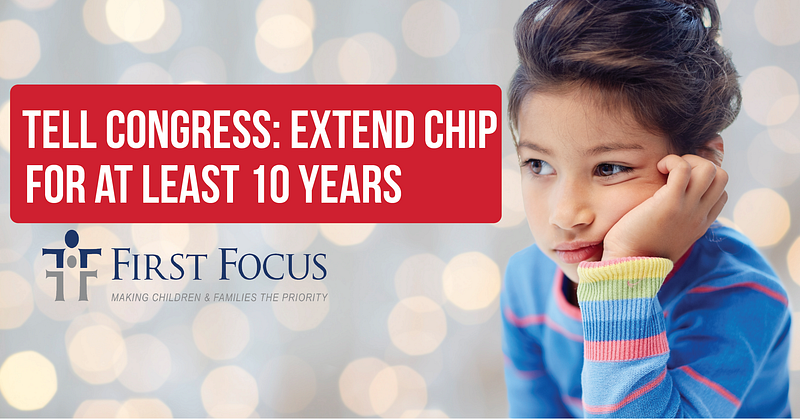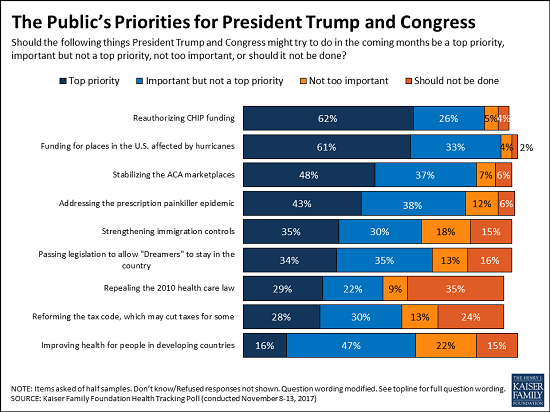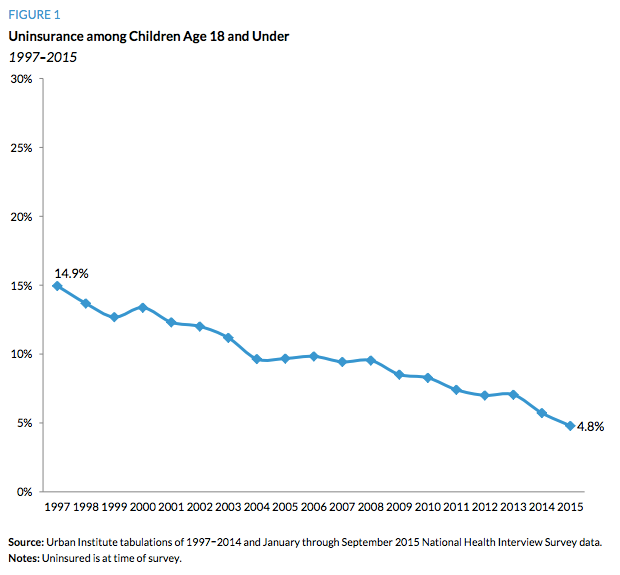We should never gamble with the health of our nation’s children. Unfortunately, through a series of short-term extensions, congressionally created funding shortfalls, and the use of the Children’s Health Insurance Program (CHIP) as hostage in legislative negotiations, the health coverage for millions of children has been repeatedly put at risk over the years.
Fortunately, Congress has a unique opportunity to give CHIP long-term stability and should seize this moment in CHIP’s history to finally make the program permanent or, at the very least, to extend the program for at least 10 years.

This opportunity arises because a new analysis by the Congressional Budget Office (CBO) estimates that a 10-year extension of the program would reduce the deficit by an estimated $6 billion. This is because CHIP is more cost effective than the alternative, which is for children to instead get their health care in more costly Affordable Care Act marketplaces. In short, CHIP is child-focused, effective, and inexpensive. It is a bipartisan national success story — something of which we are in short support.
Consequently, this presents Congress with a win-win opportunity. As Jordan Weissmann writes in Slate, “. . .it appears that Congress can now reduce the deficit by guaranteeing millions of children health coverage for 10 years instead of five. What more motivation do they need to pass a bill?”
Unfortunately, they clearly need more motivation because the House of Representatives has included just a six-year extension as part of the latest Continuing Resolution (CR). The draft legislation also unnecessarily re-imposes a “CHIP cliff” in FY 2024 by potentially underfunding the program in out-years by tens of billions of dollars. This occurs because the legislative language provides $25.9 billion for the program in FY 2023 but spends seven pages of additional text that has the intentional effect of ensuring the CBO baseline includes just $5.7 billion in the baseline for the program in out-years. Simple math points to a potentially enormous CHIP funding shortfall and crisis for a future president and Congress in 2024.
In fairness to Congress, this language has been a historical part of past extensions of the program, but the new CBO score provides Congress the unique opportunity to provide CHIP with long-term stability and to eliminate the potentially devastating “CHIP cliff,” while simultaneously reducing the federal budget deficit (an estimated $6 billion in savings over 10 years and more than $30 billion in the second decade).
Failing to take advantage of this moment is symptomatic of the on-going negligence by Congress in addressing the needs of our nation’s children. Of all the federal health coverage programs, Medicare, Medicaid, the Department of Defense’s TRICARE program, the Veterans Health Administration, the Federal Employees Health Benefits Program, and certainly the health coverage for Members of Congress and their staff are all permanent programs.
In sharp contrast, CHIP is the only one treated like a demonstration or waiver project that requires endless funding extensions in 2007, 2009, 2010, 2015, and now is 109 days past the expiration of its funding on September 30, 2017. It is unfathomable that Congress would ever treat Medicare in this manner.
Moreover, as Sen. Angus King (I-ME) points out, “Maybe it is because none of our kids are in this program. I venture to say that if the children of the members of the Senate were in the CHIP program, we would have met that deadline.”
The failure of Congress to protect children is surprising in light of the fact that 88 percent of Americans polled felt that Congress should make the extension of CHIP a top or important priority.

On the other hand, CHIP’s popularity with the American people is sometimes used against it, as politicians have taken the program hostage in negotiations often unrelated to the program. For example, in 2007, the Bush Administration sought, as reported by the Washington Post, “to use the bill reauthorizing the State Children’s Health Insurance Program to advance Bush’s proposals to expand health insurance coverage through tax breaks.” Through the negotiations, President Bush ended up vetoing the extension of CHIP twice and forced Congress to pass a simple short-term extension of the program.
Sen. Orrin Hatch (R-UT), one of the original author’s of CHIP, said at the time:
Look, I disagree with the [White House] legislative staff on all of this. Frankly, I think the president has had pretty poor advice on this. I can answer every objection that they’ve made, and I’m very favorable to the president. I know he’s compassionate. I know he’s concerned about these kids, but he’s been sold a bill of goods.
In 2009, just months after CHIP was extended, the House version of the Affordable Care Act (ACA) included a provision that would have repealed CHIP and caused the vast majority of children to be moved into the new insurance exchanges, as a way to help stabilize the insurance exchanges but likely would have resulted in higher costs and fewer benefits for millions of children.
Fortunately, the Senate, through an amendment successfully offered in the Senate Finance Committee by Sens. John “Jay” Rockefeller (D-WV) and Hatch (R-UT), restored CHIP coverage for millions of children.
The Congressional Budget Office has been very clear that replacing CHIP with private health coverage will lead some children to lose their health coverage altogether, which is harmful and intolerable. Health care reform should improve the coverage children have — not take their coverage away.
I have spent my entire career working to protect children and other vulnerable populations, and will keep fighting to protect CHIP as health care reform goes to the Senate floor, and then moves to conference with the House of Representatives. We must do all we can to shield children from harm. Always.
Another near-tragic experience for CHIP occurred in 2013 when Rep. Steve Scalise (R-LA) offered an amendment to a CR to strike funding for the ACA or Obamacare without understanding the unintended consequences for CHIP. Scalise’s amendment would have cut $13.3 billion, or 70 percent, out of CHIP — funding that had been included in the ACA to extend CHIP through FY 2015.
In 2015, while Medicare physician payments were being made permanent as part of the “Medicare Access and CHIP Reauthorization Act” (MACRA), CHIP only received what was the equivalent of less than a two-year extension of the program, despite more than 1,500 national, state, and local organizationscalling for at least a four-year extension of the program.
CHIP’s tenuous history continued with the failure of Congress to extending funding for the program before the self-imposed deadline of September 30, 2017. This is having negative consequences for the program. As J. Mario Molina, president of Golden Shore Medical Group, writes in an article entitled “Stop Holding Our Children Hostage”:
CHIP has been a success by almost every measure. Yet, our children’s needs are put behind those of everyone else. Their health insurance is being held hostage in a partisan fight over spending. States need to be able to plan ahead without fearing Congress will cut funding and sabotage their budgets.
Others have pointed to CHIP being held hostage in the current debate to help pass less popular legislation, whether it be the spending bill, immigration changes, health care extenders, or something else.
Congress should stop gambling with the program’s future through repeated short-term extensions and using CHIP as a political bargaining chip.
In a New York Times article where three different congressional leaders are quoted using the word “hostage” related to current budget negotiations, Sen. Hatch said this about CHIP:
Thanks to the repeal of the individual mandate tax, CBO updated its score and gave us the momentum to push a long-term CHIP extension across the finish line. We must stop holding CHIP hostage.
Sen. Hatch is right. The nine million children enrolled in CHIP deserve much better from our nation’s leaders. CHIP has a strong 20-year record as a bipartisan program that, in tandem with Medicaid, successfully cut the uninsured rate for children by two-thirds.

Rather than yet another short-term extension with a “CHIP cliff,” Congress has the unique opportunity to take advantage of the new CBO score, which shows CHIP coverage for nine million children could be made permanent or extended for at least 10 years while simultaneously cutting the federal deficit by $6 billion over the next decade.
This is a no-brainer. Congress must do what is best for our kids. . .now!

